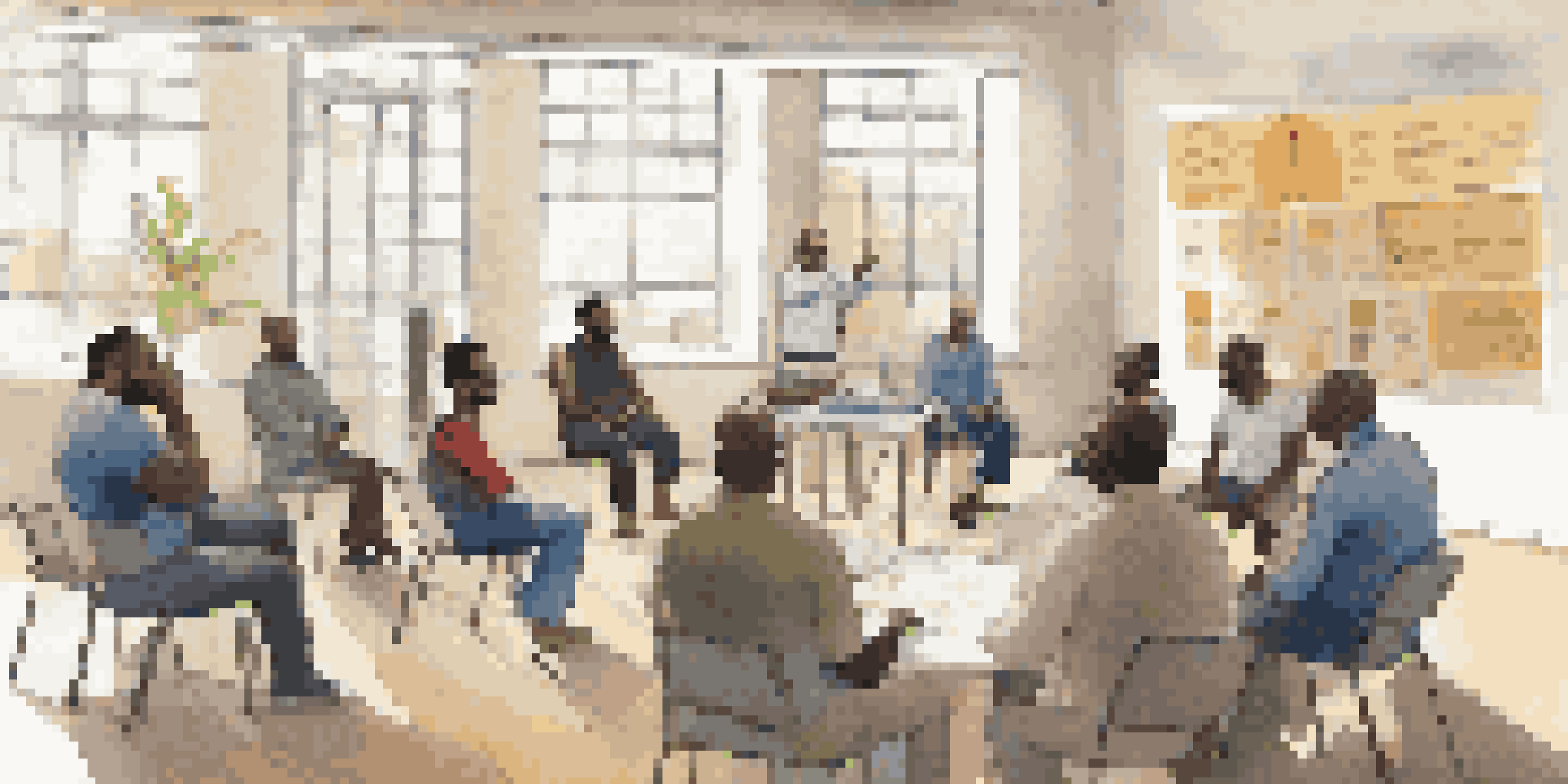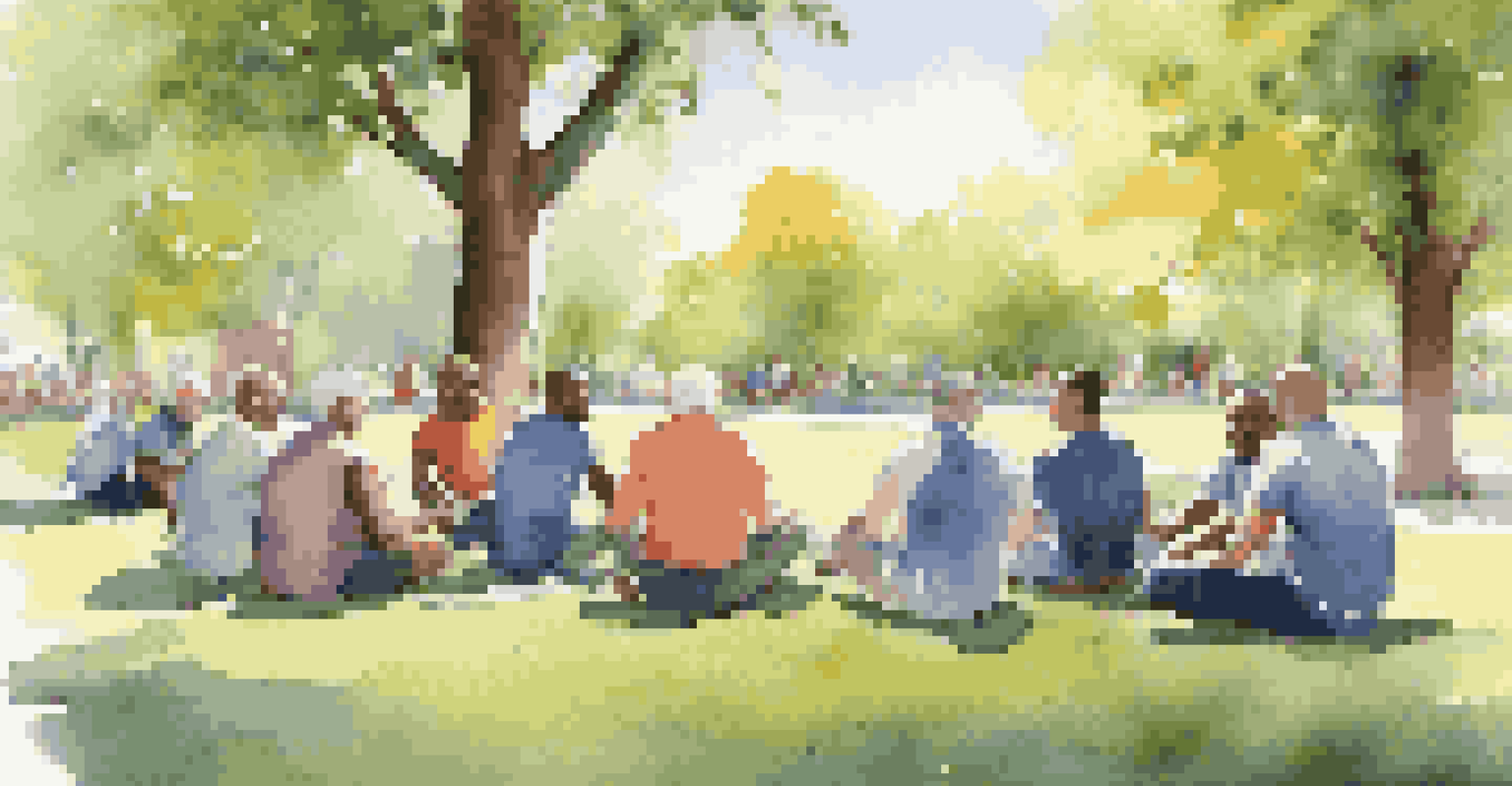Overcoming Barriers: Accessing Men's Health Resources Easily

Understanding Common Barriers to Men's Health Resources
Many men face barriers that prevent them from accessing health resources. These can include stigma, lack of information, or even time constraints. Understanding these obstacles is the first step toward overcoming them and prioritizing health.
The greatest wealth is health.
For example, some men might feel embarrassed to discuss health issues, leading to avoidance of necessary resources. Similarly, a busy lifestyle can make it challenging to find time for health appointments or education. Recognizing these barriers helps in finding effective solutions.
By fostering an open dialogue about men's health, we can begin to dismantle these barriers. It's essential for men to know they are not alone in their struggles. Awareness is the first step in making a change.
The Importance of Community Support in Men's Health
Community support plays a vital role in helping men access health resources. Friends, family, and support groups can provide encouragement and share valuable information. This network can make a significant difference in a man's health journey.

For instance, a man might feel more comfortable seeking help if his friends are also prioritizing their health. Engaging in local community health events or workshops can also foster a sense of belonging. When men are surrounded by supportive peers, they are more likely to take proactive steps.
Barriers in Men's Health Access
Men often encounter stigma, time constraints, and a lack of information that prevent them from seeking necessary health resources.
Utilizing community resources can lead to improved health outcomes. It’s about creating an environment where seeking help is normalized and encouraged. Together, we can build a healthier society.
Leveraging Technology for Health Access
In today's digital age, technology offers a wealth of resources for men's health. Telehealth services, health apps, and online forums are just a few ways men can seek help from the comfort of their homes. This accessibility can be a game changer.
Men are more likely to seek help if they know others are doing the same.
For example, a man hesitant to visit a doctor might find it easier to connect through a video call. Health apps can provide personalized advice and reminders, making it easier to stay on track. Technology breaks down geographical barriers, allowing access to specialists regardless of location.
However, it’s important to evaluate the credibility of online resources. Not all information is reliable, so men should look for reputable platforms. Embracing technology can empower men to take control of their health.
Finding Reliable Health Information Online
Navigating the internet for health information can be overwhelming. With countless websites and articles, it’s crucial to identify trustworthy sources. Men should look for official health organizations and peer-reviewed studies for accurate information.
For instance, websites like the World Health Organization (WHO) or Centers for Disease Control and Prevention (CDC) provide reliable guidance on various health topics. Additionally, men's health forums can offer personal experiences and advice, but should be approached with caution.
Community Support is Vital
Having a supportive network of friends and family can encourage men to prioritize their health and access available resources.
By focusing on credible resources, men can better educate themselves about their health. Knowledge is power, and having the right information can lead to better health decisions. Seek out resources that promote well-being.
Addressing Mental Health: An Essential Component
Mental health is just as important as physical health, yet many men overlook it. Societal norms often discourage men from expressing their emotions, leading to untreated mental health issues. Recognizing the importance of mental well-being is crucial for overall health.
Support groups, counseling, and online resources can help men address their mental health needs. For example, platforms like BetterHelp offer virtual therapy, making it easier for men to seek help without stigma. Talking openly about mental health can reduce feelings of isolation.
Taking care of mental health contributes to better physical health outcomes as well. When men feel emotionally supported, they are more likely to engage in healthy behaviors. It’s essential to prioritize mental well-being alongside physical health.
Utilizing Local Health Services and Programs
Local health services often provide essential resources tailored to men's health needs. Community health clinics, workshops, and awareness campaigns can offer valuable information and services. Engaging with these resources can bridge the gap in access to care.
For instance, many communities offer free health screenings or educational seminars that focus on men's health issues. These initiatives promote awareness and encourage proactive health measures. Men should take advantage of these opportunities to enhance their health knowledge.
Embrace Technology for Health
Utilizing telehealth services and health apps can improve access to health information and care for men, making it easier to manage their health.
By participating in local health programs, men can build connections with health professionals and other community members. This engagement fosters a supportive environment, making it easier to prioritize health and well-being. Local resources can make a significant difference.
Empowering Men to Advocate for Their Health
Men must feel empowered to advocate for their health needs. This means asking questions, seeking second opinions, and being proactive in their health care. Advocacy can lead to better outcomes and increased awareness of available resources.
For instance, if a man feels uncomfortable with a diagnosis or treatment plan, he should seek clarification or alternative options. Being an active participant in one’s health journey fosters confidence and knowledge. It’s essential to remember that health care providers are there to help.

By taking charge of their health, men can inspire others to do the same. Advocacy promotes a culture of health awareness and encourages open conversations. Together, we can create a more health-conscious society.